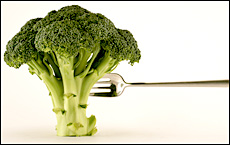Certain veges hold the key to killing cancer cellsBy Errol KiongNew Zealand Herald Sep. 18, 2006 |
Popular 
FL State Sen. Randy Fine Celebrated Israel Killing an American - Trump Just Endorsed Him For Congress

Poll: 57% of Americans Support Trump Starting Program to Deport All Illegal Immigrants

Trump Nominates Pam Bondi for Attorney General

Netanyahu Cries 'Antisemitism' After International Criminal Court Issues Warrant for His Arrest

Matt Gaetz Withdraws from Consideration as Attorney General
  Broccoli may hold the key to killing cancer cells, New Zealand scientists have discovered. Broccoli may hold the key to killing cancer cells, New Zealand scientists have discovered.A team from Otago University's Christchurch school of medicine has found that compounds from cruciferous vegetables such as broccoli, brussels sprouts and watercress help kill cancer cells which are resistant to other treatments. Their research has shown that the naturally occurring chemical compounds known as isothiocyanates cause cell-suicide in cancer cells, including in cells with high levels of the protein Bcl-2. The protein makes cells resistant to normal cell-suicide process, the key to removing damaged cells from the body. "A cancer cell with a lot of Bcl-2 has increased resistance to chemotherapy drugs that are used to destroy the tumour. We've found that Bcl-2 can't protect cancer cells against certain isothiocyanates," said lead researcher Dr Mark Hampton. The study has recently been published in the American journal, Cancer Research. The discovery opens up important avenues for new anti-cancer drugs that mimic cruciferous vegetable isothiocyanates. Such drugs would overcome the protection cancer cells get from Bcl-2 and make them more susceptible to other treatments. The challenge now is to understand exactly how isothiocyanates work inside the cell. Tests on a variety of different isothiocyanates have found that not all are effective in causing cell-suicide. "This has provided us with a very valuable clue. Isothiocyanates alter many different proteins in a cell, but by focusing on proteins that are only modified by the isothiocyanates that kill the cancer cells, we have discovered a protein that could potentially control cell death," said Dr Hampton. The information could prove valuable for designing and testing more refined chemotherapy drugs based on naturally occurring isothiocyanates. Ideally, a new drug would be effective only against tumour cells. |



